Hearing loss is a widespread health issue that affects millions of people around the globe. It can significantly impact one’s quality of life, making even simple conversations challenging. In this article, we explore the causes, symptoms, and ways to prevent hearing loss, providing readers with insights and practical advice for maintaining good hearing health.
A Patient’s Story: Understanding Hearing Loss
Imagine Linda, a 45-year-old teacher who loved her job but started noticing that she often had to ask her students to repeat themselves. Or consider Michael, a 30-year-old software developer who found that the ringing in his ears wouldn’t go away after attending a rock concert. These real-life examples illustrate how hearing loss can affect people from all walks of life, often without warning.
Hearing loss is not always a condition associated with old age; it can affect people at any stage of life due to a variety of factors, ranging from exposure to loud noises to underlying health issues.
What Are the Main Causes of Hearing Loss?
Age-Related Hearing Loss
One of the most common causes of hearing loss is aging, medically known as presbycusis. Age-related hearing loss usually occurs gradually and can affect both ears equally. By the age of 65, about one in three people experiences some degree of hearing impairment. It is often a result of changes in the inner ear or damage to the auditory nerve.
Noise-Induced Hearing Loss
Noise-induced hearing loss (NIHL) occurs when an individual is exposed to loud sounds over an extended period, such as machinery noise at work. According to the National Institute on Deafness and Other Communication Disorders (NIDCD), prolonged exposure to sounds above 85 decibels can cause irreversible damage to hearing. Protecting your ears from high volumes is critical to avoid NIHL.
“Noise-induced hearing loss is entirely preventable, but once acquired, it is permanent.” — National Institute on Deafness and Other Communication Disorders
Health Conditions and Medications
Certain health conditions like diabetes and high blood pressure can lead to hearing impairment. These medical issues can cause a lack of blood flow to the tiny structures in the inner ear, ultimately resulting in hearing damage. Some medications, known as ototoxic drugs, can also damage the inner ear, leading to temporary or permanent hearing loss. It’s essential to consult a healthcare professional if you suspect any side effects from medication.
Recognizing Symptoms of Hearing Loss
Early Signs to Watch Out For
Many people delay seeking help for hearing loss because symptoms can start subtly. Here are some early warning signs:
- Difficulty hearing conversations in noisy environments
- Frequently asking others to repeat themselves
- Ringing in the ears (tinnitus)
- Feeling as though others are mumbling
When to Seek Medical Advice
If you notice any of these symptoms, it is crucial to see an audiologist. Early diagnosis can make a big difference, particularly when considering available treatment options like hearing aids or other assistive devices.
Preventing Hearing Loss: Key Strategies
Protect Your Ears from Loud Noise
The most effective way to prevent hearing loss is to protect your ears from exposure to loud noises. For example, if you work in a loud environment, wear earplugs or noise-canceling headphones.
- Tip: When using earbuds, keep your device volume at 60% or below and take regular breaks.
Monitor and Manage Health Conditions
Controlling underlying health issues such as high blood pressure and diabetes can prevent further damage to your hearing. Regular check-ups and following your doctor’s recommendations are essential in managing these conditions.
The Impact of Lifestyle Choices on Hearing
Healthy Habits for Better Hearing
Regular physical activity and a balanced diet can contribute to good ear health. Exercise increases blood circulation, helping maintain healthy inner ear structures. Furthermore, eating a diet rich in vitamins and minerals, such as folate, zinc, and magnesium, supports overall auditory health.
“A healthy lifestyle that includes good nutrition and exercise can help preserve hearing.” — American Speech-Language-Hearing Association
Common Misconceptions about Hearing Loss
Many believe that only older adults suffer from hearing loss, but as shown with Michael’s experience, young adults are also at risk due to exposure to loud environments. Taking preventive measures early on is key.
Table: Decibel Levels and Risk of Hearing Damage
| Sound Source | Decibel Level (dB) | Risk of Damage After |
|---|---|---|
| Whisper | 30 | Safe |
| Normal Conversation | 60 | Safe |
| Traffic Noise | 85 | 8 hours |
| Rock Concert | 120 | Immediate |
Treatment Options for Hearing Loss
Assistive Devices
For those experiencing hearing loss, hearing aids are the most common solution. There are several types of hearing aids available, each designed for different levels of impairment. In certain cases, cochlear implants may be recommended for more severe hearing loss.
“Today’s hearing aids are designed to adapt to different listening environments, providing significant improvement in quality of life.” — World Health Organization (WHO)
Communication Strategies
Adapting to hearing loss often requires not only medical devices but also practical communication strategies. For instance, facing the person you are talking to and ensuring good lighting can help in lip reading and facial expression interpretation. Educating friends and family about the condition is also beneficial.
Taking Charge of Your Hearing Health
Hearing loss, whether due to age, lifestyle, or health conditions, is a serious issue that can affect anyone. By understanding the causes, recognizing symptoms early, and taking preventive measures, it is possible to protect your hearing and maintain a high quality of life. Remember, prevention is always the best treatment. Protect your ears, manage your health, and seek help when you notice the first signs.









